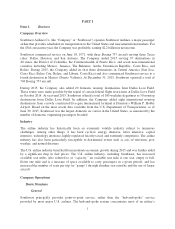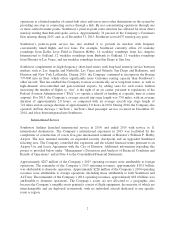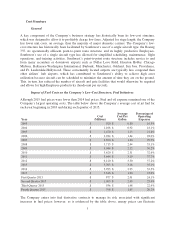Southwest Airlines 2015 Annual Report Download - page 18
Download and view the complete annual report
Please find page 18 of the 2015 Southwest Airlines annual report below. You can navigate through the pages in the report by either clicking on the pages listed below, or by using the keyword search tool below to find specific information within the annual report.The Passenger Protection Rules also subject airlines to potential DOT enforcement action for unfair
and deceptive practices in the event of chronically delayed domestic flights (i.e., domestic flights that
operate at least ten times a month and arrive more than 30 minutes late more than 50 percent of the
time during that month). In addition, airlines are required to (i) display ontime performance on their
websites; (ii) adopt customer service plans, publish those plans on their website, and audit their own
compliance with their plans; (iii) designate an employee to monitor the performance of their flights;
(iv) provide information to passengers on how to file complaints; and (v) respond in a timely and
substantive fashion to consumer complaints.
The Passenger Protection Rules also require airlines to (i) pay up to $1,350 in denied boarding
compensation to each passenger involuntarily bumped from a flight; (ii) refund any checked bag fee
for permanently lost luggage; (iii) prominently disclose all potential fees for optional ancillary services
on their websites; and (iv) refund passenger fees paid for ancillary services if a flight cancels or
oversells and a passenger is unable to take advantage of such services.
The Passenger Protection Rules also require that (i) advertised airfares include all government-
mandated taxes and fees; (ii) passengers be allowed to hold a reservation for up to 24 hours without
making a payment; (iii) passengers be allowed to cancel a paid reservation without penalty for 24 hours
after the reservation is made, as long as the reservation is made at least seven days in advance of travel;
(iv) fares may not increase after purchase; (v) baggage fees must be disclosed to the passenger at the
time of booking; (vi) the same baggage allowances and fees must apply throughout a passenger’s trip;
(vii) baggage fees must be disclosed on e-ticket confirmations; and (viii) passengers must be promptly
notified in the event of delays of more than 30 minutes or if there is a cancellation or diversion of their
flight.
The DOT has issued a proposed rule that would further expand the Passenger Protection Rules. First,
the proposed rule would require airlines to share with ticket agents fee information for “basic ancillary
services,” including fees for a first checked bag, second checked bag, carry-on items, and advance seat
selection. Second, the proposed rule would require enhanced reporting of information to the DOT by
mainline carriers for their domestic code-share partner operations. Third, the proposed rule would
require ticket agencies to disclose which carriers’ tickets they sell to avoid leading consumers to
mistakenly believe they are searching all possible flight options when in fact other options may be
available. Fourth, the proposed rule would impose a variety of additional requirements on ticket agents
and air carriers, such as public disclosures of information. The Company is not able to predict the
impact of any new consumer protection rules on its services, although the Company is likely to be
affected to a lesser degree than most other airlines, which generally offer more ancillary products and
services, and sell their services largely via ticket agencies. The DOT is expected to issue a final rule in
this proceeding in 2016.
The DOT has expressed its intent to aggressively investigate alleged violations of its consumer
protection rules. Airlines that violate any DOT regulation are subject to potential fines of up to $27,500
per occurrence.
The Company is also monitoring other potential rulemakings that could impact its business such as
(i) an FAA proposed rule designed to tighten the utilization requirements for takeoff and landing slots
operated by air carriers at the three New York City airports; (ii) a DOT proposed rule to change the
metric by which the DOT computes an air carrier’s mishandled baggage performance; (iii) a DOT
proposed rule to require air carriers to publicly disclose the revenues received from the sale of ancillary
10
























